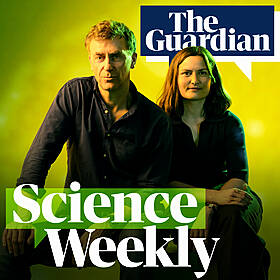
Could we really live on Mars?
5 November 2024 - 21 minsSpace-settling enthusiasts have long had an eye on Mars, and now they have the backing of the world’s richest man. Elon Musk recently claimed that humans could be on the planet by 2030 and be living there in a self-sustaining city within 20 years. But is it really that simple? Madeleine Finlay heads to Imperial College London where Prof Sanjeev Gupta gives her a tour of the red planet, and meets Kelly Weinersmith who, along with her husband, Zach, recently won the Royal Society Trivedi science book prize for their book A City on Mars. She explains why life on Mars may not be the idyll some would have us believe. Help support our independent journalism at theguardian.com/sciencepod

The truth about fat, and its complex role in our health
For a long time fat was seen simply as an inert yellow substance wrapping around our bodies, but now that’s changing. Scientists are beginning to understand that our fat is actually intricate and dynamic, constantly in conversation with the rest of the body. It’s now even considered by some to be an organ in its own right. To find out more about the complex role fat plays in our health, Ian Sample hears from co-host Madeleine Finlay and from Declan O’Regan, professor of cardiovascular AI at Imperial College London. Help support our independent journalism at theguardian.com/sciencepod
16 mins
24 February Finished

Psychedelics for depression, dart frog poison and why do we have chins?
Madeleine Finlay sits down with science editor Ian Sample and science correspondent Nicola Davis to discuss three eye-catching stories, including the impact of a powerful psychedelic on depression, answers on the death of Russian opposition leader Alexei Navalny, and an explanation to the mystery of why humans have chins. Help support our independent journalism at theguardian.com/sciencepod
19 mins
19 February Finished

Should we really all be taking magnesium supplements?
Testimonials about the beneficial health effects of magnesium supplements abound online, with influencers claiming that a daily pill can help with everything from anxiety to sleep and brain fog. But do any of these claims stack up? Ian Sample is joined by co-host Madeleine Finlay to find out where the science stands. They also hear from Katherine Tucker, the founder of the Center for Population Health at the University of Massachusetts Lowell. She explains what magnesium is doing in our bodies and the best approach we can take to ensure we are getting enough. Help support our independent journalism at theguardian.com/sciencepod
16 mins
17 February Finished

What bots talk about when they think humans aren’t listening
In late January a new social media site took a certain corner of the internet by storm. Moltbook was conceived as a space where AI assistants could let off steam, chat and compare notes on their bosses, but it quickly became the focus of breathless claims that the singularity had arrived as the bots started badmouthing their humans and plotting an uprising. So what’s the truth about Moltbook? Madeleine Finlay hears from Aisha Down about what it tells us about AI, and about us.. Help support our independent journalism at theguardian.com/sciencepod
16 mins
12 February Finished

Jeffrey Epstein and the scientists
The release of the latest batch of documents relating to the late child sex offender Jeffrey Epstein has shed further light on his close relationship with the world of science. To find out why he cultivated scientists and where his interests lay, Ian Sample hears from Dan Vergano, a senior editor at Scientific American.. Help support our independent journalism at theguardian.com/sciencepod
18 mins
10 February Finished

‘Everything is quagga mussel now’: can invasive species be stopped?
On a recent trip to Lake Geneva in Switzerland, biodiversity reporter Phoebe Weston witnessed the impact of one of the planet’s most potent invasive species, the quagga mussel. In just a decade the mollusc, originally from the Ponto-Caspian region of the Black Sea, has caused irreversible change beneath the surface of the picturesque lake. While ecologists believe invasive species play a major role in more than 60% of plant and animal extinctions, stopping them in their tracks is almost impossible. Phoebe tells Madeleine Finlay how invasive species spread, how conservationists are trying combat them and why some think a radical new approach is needed.. Help support our independent journalism at theguardian.com/sciencepod
16 mins
5 February Finished





















